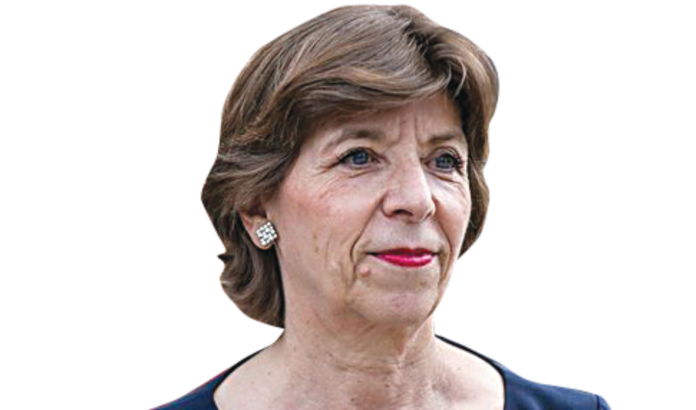NIAMEY: Key ministers from France and Niger met on Friday as French forces revamp their mission in the Sahel following a planned pullout from Mali.Foreign Minister Catherine Colonna and Defense Minister Sebastien Lecornu arrived in the Nigerien capital late on Thursday.They held talks on Friday with Foreign Minister Hassoumi Massoudou and Defense Minister Alkassoum Indatou, followed by President Mohammed Bazoum.The visit takes place as French forces complete a pullout from Mali, placing the spotlight on Niger as a frontline state in the fight against extremism, and as the unstable region struggles with a string of military coups.”We are here to show France’s commitment, at the side of the Nigerien government,” Colonna told a joint press conference.
We are here to show France’s commitment, at the side of the Nigerien government.
Catherine Colonna, Foreign minister
“We are here to respond as best we can to the needs you put forward.”Niger, a deeply poor former French colony, is the focus of a French push that hopes to stem jihadism through security as well as development. It is one of the biggest recipients of French aid, receiving EUR143 million last year.The two sides on Friday signed agreements for a French loan of EUR50 million and a grant of EUR20 million. France will also increase food aid to Niger by 66 percent this year, to 8 million euros, “at a difficult time for world food security” because of the war in Ukraine, Colonna said.”If we don’t win the war of development, we will eventually lose the war against terrorism,” Massoudou said.The French ministers were also to visit a base at Ouallam, north of Niamey, which oversees joint operations on Niger’s western border by several hundred French and Nigerien troops.
Colonna returns to Paris late Friday, while Lecornu heads to Ivory Coast, for talks with President Alassane Ouattara and a visit to French troops there.Niger has been badly hit by the insurgency that began in northern Mali in 2012 and then swept across neighboring countries.Thousands of civilians have been killed and more than two million have fled their homes.Niger itself is facing insurgencies both on its western border with Mali and Burkina Faso as well as its south-eastern frontier with Nigeria.It hosts tens of thousands of internally displaced people, as well as refugees from Burkina Faso, Mali and Nigeria.French forces who have been supporting Mali for nearly a decade are expected to complete their pullout in the coming weeks after France and the Malian junta fell out.The roots of the dispute lie in a military takeover in August 2020, which was followed by a second coup in May 2021.Friction developed over the junta’s delays in restoring civilian rule and escalated when Mali brought in Russian paramilitaries — personnel described by France as “mercenaries” from the pro-Kremlin Wagner group.Coups followed in Guinea last September and in Burkina Faso in January.At its peak, France’s Barkhane mission had 5,100 troops among five Sahel allies, all former French colonies — Burkina Faso, Chad, Mali, Mauritania and Niger.The forces have provided key support in air power, troop transport and reconnaissance. In Niger, France notably has an air base at Niamey where it has deployed drones.After the Malian pullout, the mission will have “around 2,500” troops, Barkhane commander General Laurent Michon said in an interview this month.The reconfigured mission will emphasize “more cooperative operations,” in which French forces will act in support of local armies rather than in place of them, he said.More than a thousand troops will be deployed in Niger, providing air support and training, French sources say.French troops are also in Gabon, Ivory Coast and Senegal, as well as in the east of Africa in Djibouti.On Wednesday, French President Emmanuel Macron said he had asked the government and military chiefs “to rethink our overall presence on the African continent by the autumn.”He called for “a presence that is less static and less exposed” and “a closer relationship” with African armed forces.

